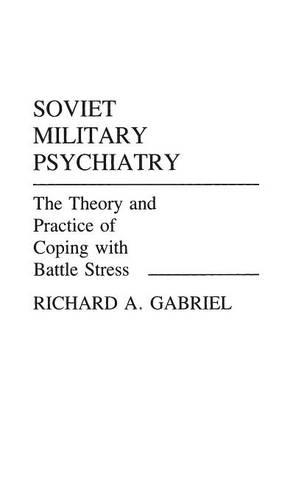
Soviet Military Psychiatry: The Theory and Practice of Coping With Battle Stress
(Hardback)
Publishing Details
Soviet Military Psychiatry: The Theory and Practice of Coping With Battle Stress
By (Author) Richard A. Gabriel
Bloomsbury Publishing PLC
Praeger Publishers Inc
21st February 1986
United States
Classifications
Tertiary Education
Non Fiction
Warfare and defence
616.85212
Physical Properties
Hardback
186
Reviews
Dr. Gabriel has provided the first comprehensive analysis of how the Soviets deal with the critical military problem of combat stress. His book presents a number of unique insights into the historical and modern Soviet experience with combat stress. Although these are often unsettling, they greatly enhance our understanding of Soviet military thinking. A truly original book which merits careful reading by Western military thinkers.-Lloyd Roberts, Chief, Life Science Branch, US Army Foreign Science/Technology Center
This is the first comprehensive treatment in English of the approach of the Soviet military to the problem of psychiatric casualities. As information on the topic is hard to secure, the book is based almost entirely on interviews with Soviet emigre experts. It contains an interesting historical overview and comparison of theoretical and practical differences between Soviet and American psychology and psychiatry; it also includes chapters on military psychiatry in WW II, preventing battle stress and battlefield psychiatry. The presentation is straightforward, clear, and contains minimal bias.-Choice
"Dr. Gabriel has provided the first comprehensive analysis of how the Soviets deal with the critical military problem of combat stress. His book presents a number of unique insights into the historical and modern Soviet experience with combat stress. Although these are often unsettling, they greatly enhance our understanding of Soviet military thinking. A truly original book which merits careful reading by Western military thinkers."-Lloyd Roberts, Chief, Life Science Branch, US Army Foreign Science/Technology Center
"This is the first comprehensive treatment in English of the approach of the Soviet military to the problem of psychiatric casualities. As information on the topic is hard to secure, the book is based almost entirely on interviews with Soviet emigre experts. It contains an interesting historical overview and comparison of theoretical and practical differences between Soviet and American psychology and psychiatry; it also includes chapters on military psychiatry in WW II, preventing battle stress and battlefield psychiatry. The presentation is straightforward, clear, and contains minimal bias."-Choice
Author Bio
briel /f Richard /i A.
